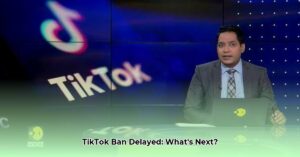The Potential TikTok Ban: A Turning Point for Social Media?
The potential ban of TikTok in the US represents a pivotal moment for the social media landscape. Driven by national security concerns surrounding its Chinese parent company, ByteDance, the app’s future in the American market remains uncertain. This article analyzes the potential repercussions of a TikTok ban, exploring the opportunities it presents for competitors and the broader implications for the future of short-form video.
Timeline: The Path to a Potential Ban
The journey toward a potential TikTok ban has been a complex one, marked by legal challenges and political maneuvering.
- 2019-2020: Early Concerns Emerge: Initial concerns arose regarding data privacy and potential Chinese government influence.
- 2020: Trump Administration Executive Orders: Former President Trump attempted to ban TikTok via executive orders, citing national security risks.
- 2020-2021: Legal Challenges and Court Battles: The legality and scope of the executive orders were challenged in court.
- 2021-Present: Biden Administration Review: The current administration continues to review the security concerns, signaling ongoing deliberation.
- 2022-Present: Congressional Action: Bills addressing foreign-owned apps like TikTok have been introduced in Congress.
This timeline illustrates the evolving and multifaceted nature of the situation.
Expert Opinions: Navigating the Complexities
The potential ban has elicited diverse perspectives. Legal experts suggest the government faces a difficult task balancing national security with First Amendment rights. Some argue a ban could set a dangerous precedent, potentially limiting online expression. Tech analysts, meanwhile, forecast market implications, predicting a reshuffling of users and ad revenue. Representatives from competing social media companies have also weighed in, some expressing cautious support for regulation, others emphasizing market competition.
Competitors: A Race to Fill the Void
Several platforms are poised to capitalize on a potential TikTok absence.
| Competitor | Key Features | Target Demographics | Potential Strategy |
|---|---|---|---|
| Instagram Reels | Music integration, AR filters, seamless Instagram sharing | Gen Z, Millennials | Leverage existing user base, enhance creator tools |
| YouTube Shorts | Integration with YouTube platform, monetization tools | Broad audience, including younger demographics | Emphasize creator revenue, cross-promotion within YouTube |
| Snapchat Spotlight | AR lenses, creative tools, short-form video content | Primarily Gen Z | Focus on unique features, strengthen community |
These platforms are actively adapting. Instagram Reels is aggressively promoting its features. YouTube Shorts leverages its vast network and monetization infrastructure. Snapchat, with its augmented reality focus, offers a unique approach. Intensifying competition will probably drive innovation in short-form video.
What’s Next: Charting the Uncertain Future
A TikTok ban’s long-term consequences are far-reaching and uncertain.
- Regulation: The case could set a precedent for regulating foreign-owned apps, potentially leading to increased scrutiny.
- Creator Economy: Millions of creators rely on TikTok. A ban could impact their reach and earnings, potentially spurring new platforms.
- User Experience: Will users seamlessly transition or experiment? Could a ban create demand for decentralized, privacy-focused platforms?
- Geopolitics: The saga reflects US-China tensions. A ban could further strain relations and impact tech sector investment.
The potential shutdown is a significant development with ripple effects across industries and geopolitics, raising questions about data security, sovereignty, and online expression.
The Immediate Impact: Winners and Losers
A TikTok ban would trigger immediate shifts. Meta (Instagram Reels) and Google (YouTube Shorts) stand to gain the most, potentially absorbing a significant portion of TikTok’s user base and advertising revenue. However, replicating TikTok’s unique blend of community and content will be challenging.
TikTok creators face the greatest uncertainty, needing to rebuild audiences and revenue streams on new platforms. This could spur innovation as creators adapt and explore alternative monetization strategies.
Small businesses relying on TikTok for marketing must also adapt, diversifying their strategies and investing in other platforms. This could create opportunities for emerging influencers and reshape influencer marketing.
The legal and ethical implications are significant. The ban raises questions about national security, data privacy, censorship, and free speech. This complex debate will likely continue for years.
The Long-Term View: A Reshaped Social Media Landscape
A TikTok ban could fundamentally alter the social media landscape. The competition for users and ad revenue will intensify, leading to a “digital land grab” among existing and emerging platforms. This competition may drive innovation, potentially leading to new platforms and formats that better address user needs and privacy concerns.
The creator economy will undergo significant changes. Creators will need to adapt, diversify, and potentially rebuild their audiences on new platforms. This period of transition may be challenging but could also foster creativity and lead to new forms of content creation.
Brands and marketers will also need to adapt, revisiting their strategies and exploring new platforms. The influencer marketing landscape will likely be reshaped, creating new opportunities for emerging influencers.
The legal and political battles surrounding TikTok underscore the growing tension between governments and technology companies, particularly those operating across national borders. This case could have lasting implications for how social media platforms are regulated and operate globally.
The long-term consequences remain uncertain. The evolving nature of social media, coupled with ongoing legal and political developments, makes predicting the future challenging. However, one thing is clear: a TikTok ban would represent a significant turning point, with the potential to reshape the digital world as we know it.
This analysis suggests several potential scenarios, but the ultimate outcome remains uncertain. Ongoing research and evolving circumstances could significantly impact the future of short-form video and the social media landscape as a whole.







